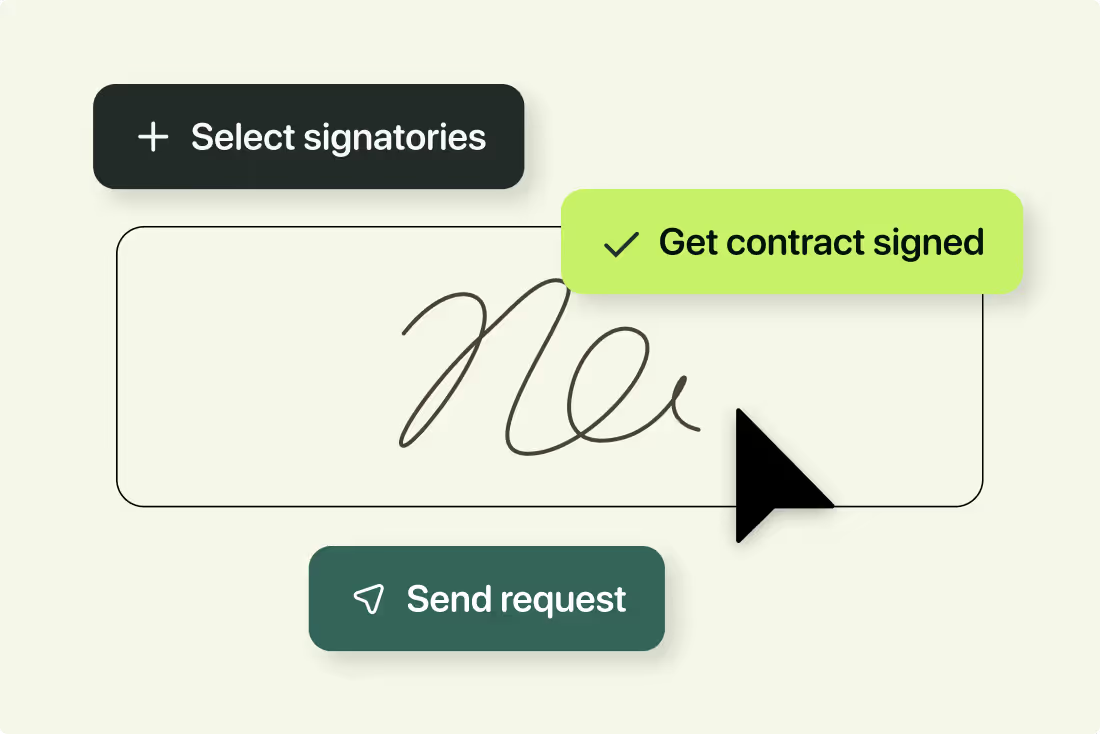Solutions
Customer Support
Resources
Contract signing is a process whereby an individual adds their signature to a contract to show that they agree with the terms included and that they wish to be legally bound by them.
The idea is that signing a contract represents a clear and unequivocal agreement between the parties, and this agreement can be proven by the fact the contract was signed.
There’s a lot more to contract signing than meets the eye, though. There are various different ways to sign a contract, and there are things to consider before you do.

Signing a contract is important because it provides parties with clarity and security when entering into legal agreements.
Firstly, it provides clarity for all contracting parties because adding a signature to a contract is an intentional act, and it shows that the party is willing to commit to the terms agreed in the contract.
Without the signature, parties will have to rely on previous conversations they’ve had to determine whether the agreement exists, and this can result in contractual disputes or misunderstandings. It’s always easier (and clearer) to capture this willingness to work together in writing, and with a signature of some sort.
Contract signing is also important because it provides the parties with legal security. As we just mentioned, signing a contract is a clear indication that the parties wish to be legally bound by the agreement.
This is an important element of a contract and there’s a chance that a contract won’t be deemed legally binding or valid without it. The simple choice to add a signature to a PDF can change the legal character of that PDF.
But if all parties sign a contract, it’s clear to the courts that this intention existed, and this gives the parties legal protection in the event that a contract is breached, or is said to have not existed.
It is possible for a contract to be enforceable without it having a signature. However, it will need to meet the requirements of a contract.
Ultimately, it will need to be clear that the counterparty accepts the offer made, and that all parties intend to enter into a legally binding relationship. Adding a signature is the clearest and most reliable way to do this, but it’s not the only way.
As we’ve discussed in previous posts, it’s also possible for emails to be legally binding, as well as text messages. But they must fulfill the requirements first, and this usually means providing clear and explicit consent within the communications. Verbal contracts can also be legally binding, but they’re harder to rely on before the court if the relationship breaks down.
To be clear: not all contracts need to be signed to be enforceable, but it does make the process of enforcing a contract much easier if they are.

It sounds obvious, but you need to review your contract in detail before signing it. Once you’ve signed a contract, you become legally bound by the terms within it, so it’s important to know exactly what you’re signing up to before you commit to anything.
Given how much legal jargon is crammed into a contract, it’s often useful to ask someone with legal expertise to review the contract, too.
Depending on your company’s risk appetite and the nature of the business contract, you may also need to escalate the contract and request approval from other stakeholders in the business.
The rules on when you need to do this are usually set out in a contract playbook of some sort. Or, if you use a tool like Juro, you can set up automated approval workflows so that agreements over a certain contract value are sent for approval automatically. This can also be set up if a contract uses non-standard terms, or if the contract is based in a certain jurisdiction.
That way, contracts that carry greater risk are sent for approval by default while other, simple contracts can progress to signing without this extra layer of approval.

If you’re not satisfied with the terms of the contract you’ll also need to negotiate the contract before signing it. This is your opportunity to agree more favourable terms with the counterparty and challenge any that you aren’t willing to accept.
The most common way to negotiate a contract is by redlining the contract, which can be done in a few different platforms:
For more tips and tricks on how to negotiate contracts effectively, check out these guides:
Once you’ve agreed on contractual terms with the counterparty, you’ll need to check that you’re actually authorized to sign the contract. This means that you’ve been given permission to enter into the agreement on behalf of your business. This is called signatory authority, and it will often be covered in a signature policy.
The rules around signatory authority are quite complex, but you can find our more about them in this guide to signatory authority.
Traditionally, most contracts were signed using wet ink signatures. This is where a signature is added to a physical copy of a contract using a pen. This method of contract signing is often still used when contracts are agreed in person, but it’s not always feasible when the parties aren’t in close proximity.
It's also more expensive, with US businesses estimated to spend $8bn each year managing paper documents, and eSignatures offering an estimated saving of $28 per signed agreement.
Today, most businesses opt to sign their contracts electronically instead. This is because electronic signatures allow individuals to sign contracts remotely and using any device. It also enables businesses to operate a paperless office, rather than having to store their contracts in filing cabinets.
Of the two options, electronic signatures give businesses the most flexibility when it comes to contract signing. Depending on the tool they use, eSignatures can also give businesses access to numerous features that make signing contracts faster and more efficient. Let’s run through some of these now.
Sequential signers (aka signing orders) are a useful contract signing feature because they businesses to set up workflows whereby certain individuals are prompted for their signatures in a specific order.
This is a great feature for contracts that have multiple signers and require approval from different individuals at different stages.
Signing reminders are a great way to make sure your contracts get signed faster. Rather than waiting around for your signatories to notice your contract in their inbox, Juro’s automated signing reminders prompt signatories to sign the contract.
Mass-signing functionality is one of the most powerful features available for companies that need to sign and manage contracts at scale. It enables senior stakeholders to sign hundreds of contracts in just a few clicks, rather than manually signing them one by one.
{{quote1}}
Businesses that manage and sign a lot of contracts will also benefit from a contract analytics feature that generates contract signing insights. This provides individuals with visibility into how long contracts take to get signed and helps them to identify blockers along the way.
Juro’s collaborative contract management software enables businesses to sign contracts faster using the features described above. If you’re interested in joining the 6000+ companies already using Juro to speed up their contract workflow and reduce manual admin, book a personalized demo using the form below.

Lorem ipsum dolor sit amet, consectetur adipiscing elit. Suspendisse varius enim in eros elementum tristique. Duis cursus, mi quis viverra ornare, eros dolor interdum nulla, ut commodo diam libero vitae erat. Aenean faucibus nibh et justo cursus id rutrum lorem imperdiet. Nunc ut sem vitae risus tristique posuere.

